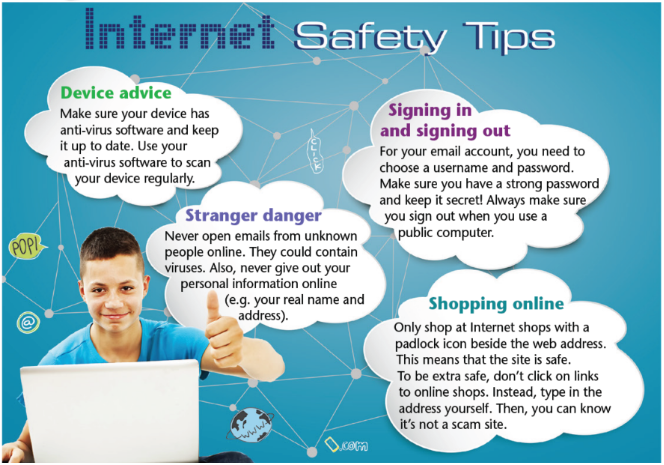Tiếng Anh Unit 4 4. CLIL1. What do we need to do to stay safe on the Internet?Listen and read to find out. 2. Read the text again and complete the sentences. 3. List the ideas in the text under the headings Dos and Don’t in your notebook. Tell the class. 4. What did you know about Internet safety? What did you learn from the text? How can these tips help you? Write a few sentences in your notebook. Tell your partner. GÓP Ý HAY - NHẬN NGAY QUÀ CHẤT Gửi góp ý cho HocTot.Nam.Name.Vn và nhận về những phần quà hấp dẫn
Lựa chọn câu để xem lời giải nhanh hơn
CLIL (ICT) (Information and communication Technologies: Công nghệ thông tin và truyền thông.) Bài 1 1. What do we need to do to stay safe on the Internet? Listen and read to find out. (Chúng ta cần làm gì để giữ an toàn trên Internet? Nghe và đọc để tìm ra cách.)  Internet Safety Tips Device advice Make sure your device has anti- virus software and keep it up to date. Use your anti- virus software to scan your device regularly. Stranger danger Never open emails from unknown people online. They could contain viruses. Also, never give out your personal information online (e.g. your real name and address.) Signing in and signing out. For your email account, you need to choose a username and password. Make sure you have a strong password and keep it secret! Always make sure you sign out when you use a public computer. Shopping online Only shop at Internet shops with a padlock icon beside the web address. This means that the site is safe. To be extra safe, don’t click on links to online shops. Instead, type in the address yourself. Then, you can know it’s not a scam site. Phương pháp giải: Tạm dịch: Mẹo an toàn trên mạng Lời khuyên về thiết bị Chắc chắn rằng thiết bị của bạn có phần mềm chống vi rút và luôn cập nhật nó. Sử dụng phần mềm chống vi rút để quét thiết bị của bạn thường xuyên. Người lạ nguy hiểm Đừng bao giờ mở email từ một người lạ trên mạng. Chúng có thể chứa vi rút. Đồng thời, đừng bao giờ công khai thông tin cá nhân trên mạng (ví dụ như tên thật và địa chỉ.) Đăng nhập và đăng xuất Đối với tài khoản email, bạn cần chọn tên tài khoản và mật khẩu. Hãy chắc chắn bạn có mật khẩu mạnh và giữ nó bí mật! Luôn luôn chắc chắn đã đăng xuất khi sử dụng máy tính công cộng. Shopping online Chỉ mua sắm tại các cửa hàng trên Internet có biểu tượng ổ khóa bên cạnh địa chỉ web. Điều này có nghĩa là trang web đó an toàn. Để an toàn hơn, đừng nhấp vào các liên kết đến các cửa hàng trực tuyến. Thay vào đó, hãy tự nhập địa chỉ. Sau đó, bạn có thể biết đó có phải là trang web lừa đảo hay không. Lời giải chi tiết: To stay safe online, you should install anti- virus software on your devices, create a safe password for your email account, and be careful about the emails from unknown people and the websites to the shops. (Để giữ an toàn trên mạng, bạn nên tải phần mềm chống vi rút trên các thiết bị của bạn, tạo mật khẩu an toàn cho tài khoản email, và cẩn thận với những email từ những người lạ và các trang web từ các cửa hàng.) Bài 2 2. Read the text again and complete the sentences. (Đọc lại đoạn văn bản và hoàn thành các câu.) 1. It’s important to install ___________________ . 2. Your password must be ___________________ . 3. Some emails can be unsafe because they ___________________ . 4. When you want to visit an online shop, you should ___________________ .
Lời giải chi tiết: 1. It’s important to install anti– virus software. (Điều quan trọng là cài đặt phần mềm chống vi rút.) Thông tin: “Make sure your device has anti- virus software and keep it up to date.” (Chắc chắn rằng thiết bị của bạn có phần mềm chống vi rút và luôn cập nhật nó.) 2. Your password must be strong. (Mật khẩu của bạn phải mạnh.) Thông tin:; “Make sure you have a strong password and keep it secret!” (Hãy chắc chắn bạn có mật khẩu mạnh và giữ nó bí mật!) 3. Some emails can be unsafe because they could contain viruses. (Một số email có thể không an toàn vì chúng có thể chứa nhiều vi rút.) Thông tin: “Never open emails from unknown people online. They could contain viruses.” (Đừng bao giờ mở email từ một người lạ trên mạng. Chúng có thể chứa vi rút.) 4. When you want to visit an online shop, you should visit shops with a padlock icon and type in the address yourself. (Khi bạn muốn mua sắm online, bạn nên chọn cửa hàng có biểu tượng ổ khóa và tự mình nhập địa chỉ.) Thông tin: “Only shop at Internet shops with a padlock icon beside the web address. This means that the site is safe./ Instead, type in the address yourself.” (Chỉ mua sắm tại các cửa hàng trên Internet có biểu tượng ổ khóa bên cạnh địa chỉ web. Điều này có nghĩa là trang web đó an toàn./ Thay vào đó, hãy tự nhập địa chỉ.)
Bài 3 3. List the ideas in the text under the headings Dos and Don’t in your notebook. Tell the class. (Liệt kê các ý kiến trong đoạn văn bản vào các mục làm và không làm trong vở của bạn. Nói cho cả lớp.) Lời giải chi tiết:
Bài 4 4. What did you know about Internet safety? What did you learn from the text? How can these tips help you? Write a few sentences in your notebook. Tell your partner. (Bạn hiểu gì về an toàn Internet? Bạn học được gì từ đoạn văn bản? Các mẹo này giúp bạn như thế nào? Viết một vài câu vào vở. Nói với bạn cùng bàn.) Lời giải chi tiết: I knew it’s important to have anti- virus software and to use it regularly to scan my computer. I knew I mustn’t open emails from unknown people and keep personal information private. I also knew I need to have a strong password and to sign out when I use a public computer. I didn’t know about the padlock icon on Internet shops or about clicking on links rather than going to the website directly. I will remember this and use its to stay safe from scam sites in the future. (Tôi đã biết được có phần mềm chống vi rút rất quan trọng và sử dụng nó thường xuyên để quét máy tính. Tôi đã biết tôi không được mở các email từ người lạ và giữ kín các thông tin cá nhân. Tôi cũng biết tôi cần đặt mật khẩu mạnh và đăng xuất khi tôi sử dụng máy tính công cộng. Tôi không biết về biểu tượng khóa trên các cửa hàng trực tuyến hay nhấn vào các đường liên kết thay vì đi thẳng đến các trang web. Tôi sẽ nhớ điều này và dùng nó để giữ an toàn khỏi những trang web lừa đảo trong tương lai.
>> Học trực tuyến lớp 7 trên Tuyensinh247.com. Đầy đủ khoá học các bộ sách: Kết nối tri thức với cuộc sống; Chân trời sáng tạo; Cánh diều. Cam kết giúp học sinh lớp 7 học tốt, hoàn trả học phí nếu học không hiệu quả. PH/HS tham khảo chi tiết khoá học tại: Link
|



















